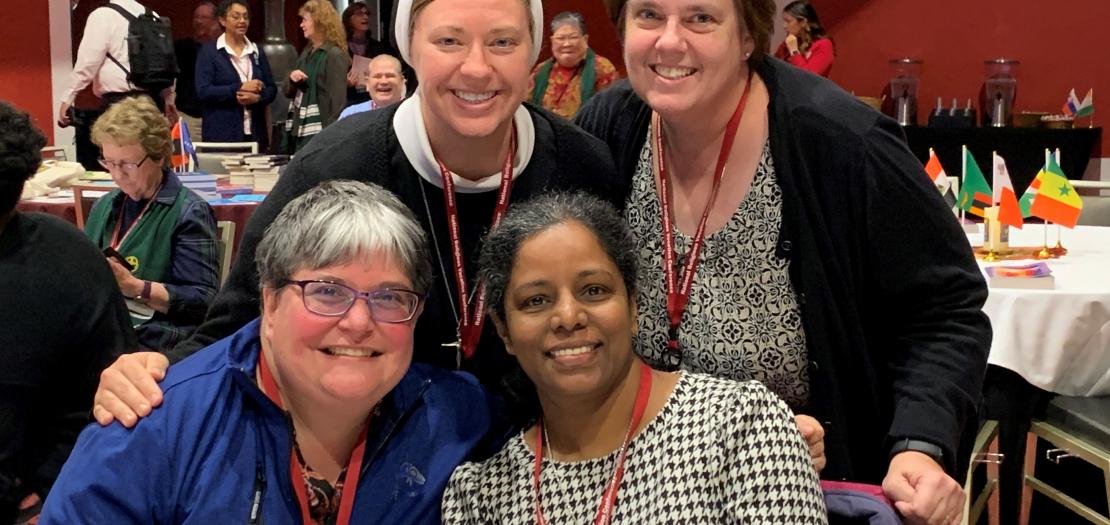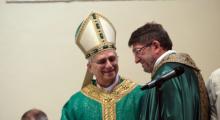Issued by the Catholic Center for Studies and Media - Jordan. Editor-in-chief Fr. Rif'at Bader - موقع أبونا abouna.org

I still remember the time one of my fifth-grade students raised her hand and said, "Sister, where does Catherine McAuley live?" The students started to discuss where she lives. One said she lives in California and another student corrected her and said, "No, you weren't listening to the video: She lives in Ireland." From across the room another student said, "None of you were listening — she is dead!"
Catherine McAuley died on November 11, 1841. This anniversary causes me to ponder the significance of one life. Catherine started the Sisters of Mercy in 1831. Catherine used her inheritance to start a home for women in Dublin, Ireland, who were being abused by those for whom they worked as servants. She provided a safe place for women. Catherine had a deep love for God and connected her faith to helping others. She died 10 years later.
The 2,000 Sisters of Mercy of the Americas alive today carry out the work Catherine McAuley started so long ago. Most high school students who attend a Mercy high school van tell you who she was. People who have been served in shelters, hospitals and many other places might not be able to tell you who Catherine was, but they often remember the sister who was kind to them when they needed a smile, a hug, or someone to listen to them.
Men and women from various religious communities gathered November 3-6 in Spokane, Washington, for a convocation hosted by the National Religious Vocation Conference. Those who accompany men and women on their possible journey to join religious life came together to pray, to hear speakers and discuss how to continue to invite others to religious life. There were many different congregations and charisms present. Some serve the poor and marginalized, some advocate for social justice on many different levels, some are passionate about the environment, others work directly in parishes.
The gifts each sister, brother or priest brings to their congregation was evident through my conversations with different people during the conference. Consecrated life is a gift to the church. What has stayed with me since leaving the conference is the joy that was present in each person I met and talked with. I had not previously met most of the people there, but in most conversations I could hear the joy that they have in living as a sister, brother or priest. This came out in the stories they told about the other religious they live with and the people they serve.
This week is National Vocations Awareness Week — a week to celebrate and share through social media and other ways what brothers, sisters or priests do. Often this is through videos promoting religious life and — especially this week — priests, sisters and brothers will talk about being called to religious life. Most people at the conference were vocation ministers. It is their job to accompany young people though the journey of finding their vocation, to help them learn where God is calling them.
Although I didn't really want to listen when I felt the initial call to religious life, I did eventually say "yes." This "yes" has led me on a journey of discovery, of figuring out how to love myself, God and others. I am a Sister of Mercy because I listened to and responded to a call not much different than Catherine's. Today I listen to where God is leading my life, and I pay attention to where God is in the people I meet. This leads to the deep joy I have when I say I love my life as a sister.
I was having a conversation with a friend who is in a religious order; he was talking about how each person has a vocation. He described how his parents' vocation was raising him and his siblings, and how they love him and take delight in their children and grandchildren. He described them as joy-filled and happy in their vocation as parents.
I think the reason Catherine McAuley's story is still important today. Hers and stories of other founders are important and relevant because they highlight a "yes" to a call from God. They trusted and their "yes" created many different religious orders and charisms for women and men, which continue to respond to God's call today.
This led me back to pondering about the significance of one life and prompted me to ask the question in the words of Mary Oliver: "Tell me, what is it you plan to do. With your one wild and precious life?"







